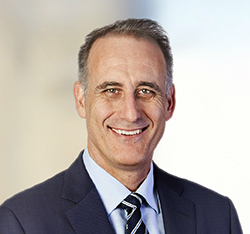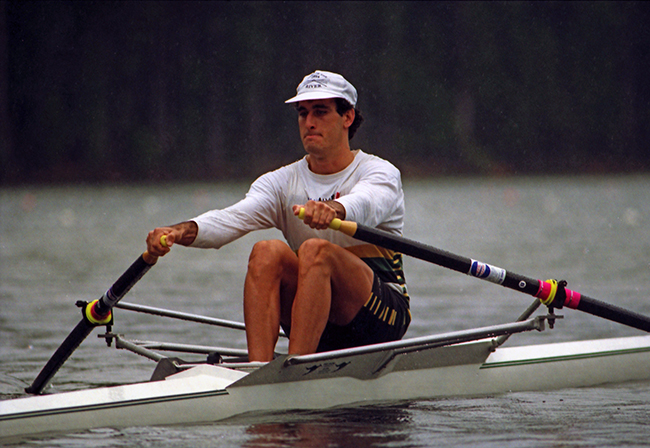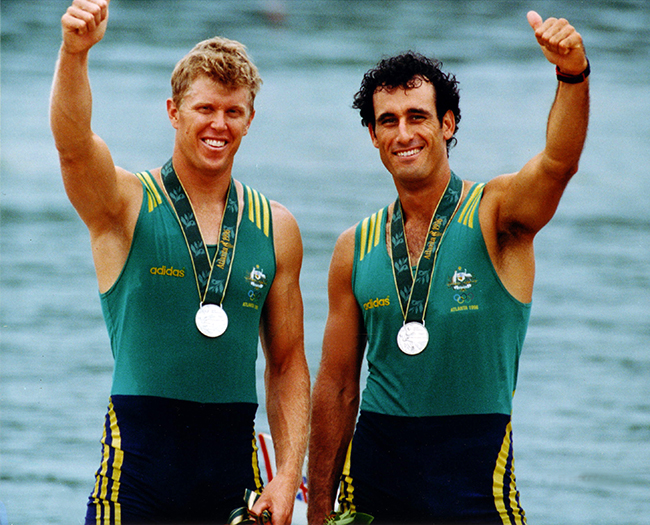Robert G Scott

Swan River Rowing Club (WA), then his home club Curtin University Boat Club (WA), and whilst living in Sydney, Mosman Rowing Club (NSW)
Robert is a highly respected and superb leader of the sport of rowing, as well as one being one of its great athletes.
Being the son of teachers who taught in various parts of Western Australia, his schooling was undertaken at various schools. He finished his schooling at Rossmoyne High School in Perth. It was whilst he was Rossmoyne that he commenced his rowing journey, when this sport was offered as an option. It was offered by the Amateur Rowing Association of WA, and the coach Chris Holliday, encouraged Rob and a few friends to come down to Swan River Rowing Club to learn more about rowing. Sculling was to be his initial choice, but he was advised early by mentor and friend Tony Lovrich that to maxmise prospects for selection, WA rowers should learn to scull and row both sides. This would prove to be good advice, as Scott rowed at two Olympics on different sides. Being identified as an emerging talent, the Western Australian Institute of Sport took him under their wing to develop. His first attempt at the national level was competing in the under 19 single and double scull at Lake Barrington in 1987. With more experience and training, the move to under 23’s was within reach. His confidence and leadership was already evident stroking the Western Australian Youth Eight at the Interstate Championships in Tasmania in 1988.
Moving around was natural to Rob, so when invited to train at the Australian Institute of Sport in Canberra in late 1989, the opportunity was taken. His education continued at the Australian National University where he completed a Commerce degree. For the most part his international rowing career was based in key positions in eights, a notoriously difficult boat class to win. Not only do you need good talent, but also need a superb functioning team.
It was no surprise to read quotes from him emphasising the importance of teams when quoted in the West Australian on 14th February 2017 upon his appointment head of Wesfarmers industrial division.
I know I can achieve a lot more when I work in teams than I can as an individual. And I guess I’ve learnt over the years you should always hire people who are better and smarter than you. And that’s my focus, to try to assemble really high performing teams and try to create an environment for the team to be successful. Rowing is synonymous with teamwork. You might be in an eight and you can be the best rower in the world and the eight will go slow. It’s about getting the best team and letting that team prosper in that environment.

Rob trying his hand out at sculling at 1994 National Championships at Lake Barrington
Rob’s highest rowing competition success came in 1996, from a small boat, the pair.
He and good friend David Weightman set out after a disappointing 1995 World Championship eights campaign to prove their undoubted skill in the pair. The combination was initiated by a photo shoot arranged by their employer Ernst & Young. After taking a few strokes in the pair, they were encouraged by the potential and decided to row together. They worked under aspiring young coach and past champion rower, Steve Evans at the AIS. Their task was monumental given the current World and Olympic Champions, Steve Redgrave and Matthew Pinsent, were considered by most to be unbeatable having led this category since their Olympic win in 1992, and the current silver medallists were an Australian pair. The hurdles to success were set high and a more difficult sweep boat class could not have been considered. Rob reflects that Steve Evan’s relentless focus on technical excellence and boat moving was instrumental in their success that season.
Their National Championships went to plan taking out the pair, coxless four and eight in a clean sweep. They gained selection as Australia’s Olympic pair under coach Harald Jahrling. The first hurdle had been taken cleanly. Jahrling brought a highly sophisticated approach to training, informed by his sports science studies in Germany, and was an advocate of altitude training that was core to their preparation for Atlanta.
Then came the overseas competition in Lucerne. Redgrave and Pinsent unusually did not race leaving the race to the Aussies followed by the French. The British crew’s concerns about the Australians commenced. This fear was not abated by strong wins by Scott and Weightman in the heat and semi-final at the Olympic regatta. (The regatta seeding led to these crews being on opposite sides of the draw.) This set up a great race for the final.
The British crew knew that they needed to shock the Australians and used the advantage of their undoubted strength to blast off the start with a flying first 500m. Such a tactic comes with a physical cost. The Australians fought back closing the gap as the British crew paid for their fast start. Sadly for the Australians, the race went to the reigning champions Britain by less than a second. Redgrave got his fourth Olympic Gold medal over four Olympic Games.

On the podium at 1996 Olympic Games with David Weightman
After taking some time away from rowing to progress his post graduate studies and work as an investment banker, Rob continued his rowing partnership with Dave Weightman (also an investment banker with Macquarie Bank).
One of the highlights in Rob’s rowing career was wining the Kings Cup for WA in 1999 at West Lakes. It was a relatively young crew, with a number of scullers coached by Nick Garrat. Rob had rowed in various Kings Cups, and placed a close second on a number of occasions. The 1999 crew, stroked by Stuart Reside with Rob in seven seat, and fellow Olympic medallist Ron Snook in six seat, had a magical feel from the first session in training. They went on to beat the more experienced Victorian Eight, and demonstrated how seriously WA treats the interstate race.
Scott and Weightman were unavailable for national selection in 1999 given work commitments and having been recently promoted. They continued to row in 2000, and won the national championships and Olympic trials in the pairs – Scott’s third national coxless pairs championship. The final selection of the pair for the Olympics was deferred to the Lucerne regatta given that the reigning World Champion pair of James Tompkins and Drew Ginn were injured. As it transpired, Scott and Weightman were beaten by Tomkins and partner at the Lucerne regatta. As the opportunity to be considered for other crews was not available, both Scott and Weightman retired from rowing, and devoted their efforts in their professional careers.
Scott was to enjoy some measure of success at the 2000 Olympic Games, with his fiancée Liz Weekes, winning a gold medal in the Womens’ water polo.
This was not to be the end of Rob’s career in the sport. In 2014, he was elected President of Rowing Australia, a position which he currently holds and is due to step down from in 2024. As previously mentioned, this was a period of necessary change and his leadership was again called upon. The sport needed to centralise the high performance group to remain competitive. Two national training centres were established which created a significant fixed cost for the organisation. But the results improved and Australian rowing is a world force in the sport. The sponsorship of Mrs Gina Reinhart to rowing was a necessary part of the success of the national training centres enabling the athletes to be paid a weekly stipend to be able to live as professional athletes.
He has led the sport superbly as President is other ways as well. Specifically, he has:
- overseen the development of a whole-of-sport overarching longer-term strategy ensuring the organisation does not lose sight of its clear and contemporary vision and purpose
- had oversight of significant innovations within the sport of rowing such as coastal rowing and indoor rowing and also the expansion of para-rowing - these in turn has seen rowing become more accessible to much wider audiences across the nation and abroad who are now able to participate
- ensured Rowing Australia is in a strong position financially by provided both high-level engagement with philanthropic partners and important support in the management of key sponsors of the organisation
- recruited good key staff of Rowing Australia to support the change whilst creating new opportunities for the development of senior staff thus creating a pipeline of leaders and coaching CEO's to ensure a contemporary, leading-edge approach is taken to the leadership of one of Australia's great Olympic sports.
In addition, his chairmanship of the Rowing Australia Board has been exceptional. He has:
- used his exceptional skills as the Chairman in enabling a cohesive and coordinated team at board level
- ensured the board operates in an inclusive and respectful environment
- provided effective Chairmanship in his ability to bring contentious matters to conclusion after considering all perspectives
- always been very open and responsive to advice and acts promptly on the advice for the betterment of the sport as a whole
- been a pragmatic, engaging, approachable leader
- placed his focus on, and is decisive about, matters of strategic importance (not operational detail)
- been extremely generous with his time and commitment to the sport of rowing and Olympic sport at the national level
His endeavours have left a strong legacy, not for rowing, but for sport generally.
Rob has provided and assisted more generally sport in Australia by taking on pivotal national positions such as his directorship of the 2032 Brisbane Olympic Organising Committee.
It is interesting to reflect that similar traits can be found in his professional life. Commencing as an intern at Wesfarmers and rising rapidly through the ranks to managing director, even with a break outside Wesfarmers into investment banking. His work at Wesfarmers has the hallmarks of inclusion and leadership, whilst driving the continued commercial success of the conglomerate. He is a renown leader of Australian business.
The Wesfarmers website describes his career as follows:
Rob was appointed Managing Director and Chief Executive Officer of Wesfarmers in November 2017 following his appointment as Deputy Chief Executive Officer in February 2017. Prior to this, he was Managing Director of the Wesfarmers Industrials division from August 2015 until August 2017.
Rob started with Wesfarmers in 1993 before moving into investment banking, where he had various roles in corporate finance and mergers and acquisitions in Australia and Asia. Rob rejoined Wesfarmers in 2004 in a commercial role in business development, before being appointed Managing Director of Wesfarmers Insurance in 2007 and then Finance Director of Coles in February 2013. He was appointed to the role of Managing Director, Financial Services in October 2014.
Rob holds a Master of Applied Finance degree from Macquarie University and a Bachelor of Commerce degree from the Australian National University. He has a Graduate Diploma in Applied Finance and Investments, is a qualified Chartered Accountant and has completed the Advanced Management Program at Harvard Business School. He is a dual Olympian in rowing and a silver medallist from the 1996 Atlanta Olympics. He is Chairman of Rowing Australia, a director of the Brisbane 2032 Board, Gresham Partners and the Business Council of Australia. Rob is also a member of The University of Western Australia Business School Advisory Board and a past president and director of the Insurance Council of Australia.
The sport is fortunate to have Rob as its President.
In recent years, Rob joined some of his team mates from the winning 1999 Kings Cup crew to get back into rowing in the Master competition. The crew, known locally as the Black Swans, has won the state masters championships in WA and is looking forward to competing nationally and internationally in the years ahead.
Known rowing history of key events
1987 – National Championships, Men’s Under 19 Scull- unplaced
1987 – National Championships, Men’s Under 19 Double Scull- Fifth
1988 – Interstate Championships, Wilkinson Cup, stroke – Fifth
1989 – National Championships, Men’s Under 23 Pair, stroke – Second
1989 – National Championships, Men’s Under 23 Eight, seven– final not conducted due to cyclone
1989 – Interstate Championships, King’s Cup, seven seat – no race due to cyclone
1989 – Trans Tasman Under 23 series, Men’s Eight, stroke
1990 – National Championships, Men’s Pair, bow – Unplaced
1990 – National Championships, Men’s Coxed Four, bow - Sixth
1990 – National Championships, Men’s Under 23 Eight, six seat - Second
1990 – Interstate Championships, King’s Cup, six seat – Second
1990 – Nations Cup (now World Under 23 World Championships), Men’s Eight, seven seat – Fifth
1990- World Championships, Men’s Eight, seven seat – Eighth
1991 – National Championships, Men’s Pair, stroke – First
1991 – National Championships, Men’s Coxed Four, stroke - Fourth
1991 – Interstate Championships, King’s Cup, four seat – Third
1991- World Championships, Men’s Eight, seven seat – Tenth
1992 – National Championships, Men’s Coxless Four, stroke – Third
1992 – National Championships, Men’s Coxed Four, stroke – Second
1992 – Interstate Championships, King’s Cup, five seat – Second
1992 – Olympic Games, Men’s Eight, stroke – Fifth
1993 – National Championships, Men’s Pair, stroke – Fourth
1993 – National Championships, Men’s Coxed Four, three seat – Third
1993 – Interstate Championships, King’s Cup, stroke - Second
1993- World Championships, Men’s Eight, stroke - Fourth
1994 – Interstate Championships, King’s Cup, stroke - Fourth
1995 – National Championships, Men’s Pair, stroke – Sixth
1995 – National Championships, Men’s Coxed Four, Three seat – First
1995- World Championships, Men’s Eight, stroke - Eleventh
1996 – National Championships, Men’s Pair, stroke – First
1996 – National Championships, Men’s Coxless Four, stroke – First
1996 – National Championships, Men’s Eight, stroke – First
1996 – Interstate Championships, King’s Cup, stroke - Fourth
1996 – Olympic Games, Men’s Pair, stroke – Silver
1999 – Interstate Championships, King’s Cup, seven seat, First
2000 – National Championships, Men’s Pair, stroke, First
Andrew Guerin
December 2023
Sources:
- Author’s own records including this website
- Australian Olympic Committee website extracted 28th December 2023 - Robert Scott | Australian Olympic Committee (olympics.com.au) (olympics.com.au)
- Wesfarmers website extracted 4th November 2023 - Rob Scott (wesfarmers.com.au)
- The West Australian - Rob Scott: From Olympic rower to captaining the ship | The West Australian extracted 4th November 2023
- Discussions with Rowing Australia directors and staff – November 2023

